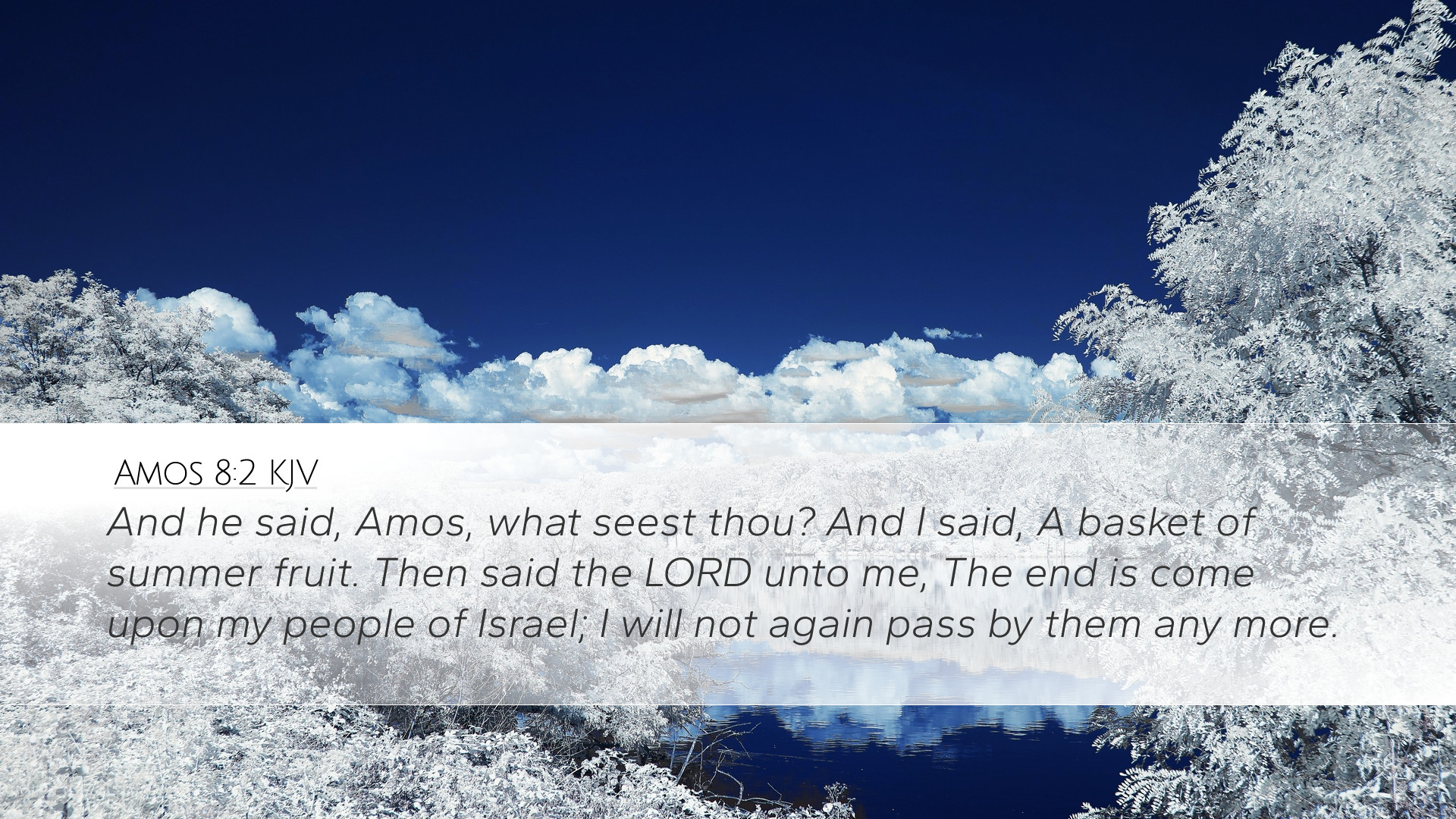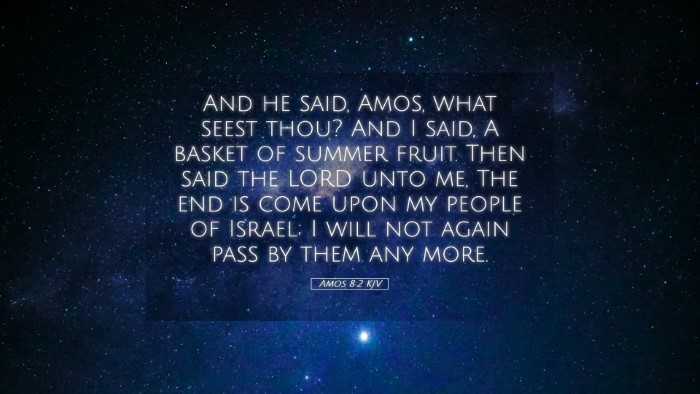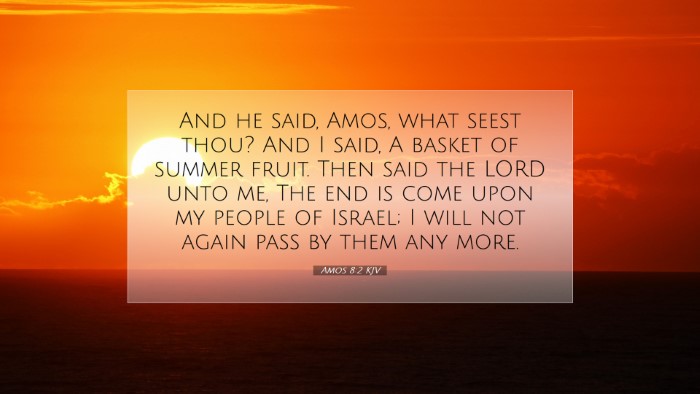Old Testament
Genesis Exodus Leviticus Numbers Deuteronomy Joshua Judges Ruth 1 Samuel 2 Samuel 1 Kings 2 Kings 1 Chronicles 2 Chronicles Ezra Nehemiah Esther Job Psalms Proverbs Ecclesiastes Song of Solomon Isaiah Jeremiah Lamentations Ezekiel Daniel Hosea Joel Amos Obadiah Jonah Micah Nahum Habakkuk Zephaniah Haggai Zechariah MalachiAmos 8:2
Amos 8:2 KJV
And he said, Amos, what seest thou? And I said, A basket of summer fruit. Then said the LORD unto me, The end is come upon my people of Israel; I will not again pass by them any more.
Amos 8:2 Bible Commentary
Commentary on Amos 8:2
Amos 8:2 states, "And he said, Amos, what seest thou? And I said, A basket of summer fruit. Then said the Lord unto me, The end is come upon my people of Israel; I will not again pass by them any more." This verse serves as a pivotal moment in the prophet Amos's message, encapsulating both a vision and a declaration of impending judgment.
Overview of Amos's Context
Amos prophesied during a time of relative prosperity in Israel, a period characterized by social inequality, rampant injustice, and moral decay. His prophetic declarations were often stark and uncompromising, aimed at waking his audience from their complacency.
The Vision of the Basket of Summer Fruit
The imagery of a "basket of summer fruit" is rich in meaning. It signifies the ripeness and readiness of fruit, which alludes to the moral and spiritual decay of Israel at this time.
- Maturity and Judgment: Just as summer fruit is ripe and signifies the completion of its cycle, so too is Israel's sinfulness perceived as having reached its peak. Matthew Henry notes that this symbolizes the certain approach of judgment.
- Seasonality: The seasonal aspect of summer fruit points to the timeliness of God's message. Just as summer brings a harvest, Israel's actions have produced a crop of wrath that is ready for harvest as well.
Divine Inquiry: "What Seest Thou?"
God's question to Amos, "What seest thou?" emphasizes the importance of prophetic vision. Amos's role as a seer is underscored here. His ability to perceive spiritual truths and convey them accurately is paramount.
- God’s Engagement: God's question suggests an active engagement with the prophet. It reflects God's desire to communicate and work alongside His chosen instruments to reveal His plans to the people.
- Prophetic Insight: As Albert Barnes comments, the way Amos responds indicates his understanding of his role and the implications of what he sees. The vision is both a revelation and a warning.
The Declaration of Judgment
The phrase "The end is come upon my people of Israel" reflects a significant turning point in God's dealings with His people. His patience has reached its limits, and the time for judgment is at hand.
- Theological Implication: In calling it "the end," God implies a definitive closure to the opportunity for repentance. Adam Clarke notes that God's refusal to "pass by them anymore" speaks to a profound moment in divine history where grace transitions to judgment.
- The Importance of Time: The mention of "end" signifies urgency. The timing of God's judgment highlights the necessity of moral accountability and the consequences of persistent disobedience.
Theological Themes
This verse encapsulates several key theological themes that warrant deeper contemplation:
- God's Sovereignty: The decisive action of God illustrates His sovereign authority over nations and peoples. His control over the timing and nature of judgment showcases His divine rule and governance.
- Human Responsibility: The abundant warnings and calls to change behavior highlight the human responsibility to respond to God's word. The longing of God for His people to turn back is evident throughout the prophetic writings.
- Justice and Mercy: The tension between justice and mercy is a recurring theme in the Scriptures. While God holds His people accountable, He simultaneously offers them chances for redemption, a theme central to the prophetic message.
Application for Modern Readers
For contemporary pastors, students, theologians, and Bible scholars, this verse serves as both a warning and a reflection on the moral landscape of today's society:
- Discernment in Leadership: Church leaders must cultivate discernment in their ministries, ensuring they communicate God's messages faithfully, addressing moral issues within their congregations.
- Cultural Reflection: Modern believers are challenged to consider the cultural and ethical implications of their actions. Much like Israel, today's society faces its own set of moral dilemmas that require diligent reflection.
- Urgency of Repentance: The urgency of Amos's message serves as a call to action for believers to engage in self-examination and seek authentic repentance, promoting spiritual renewal in both individual lives and the broader community.
Conclusion
Amos 8:2 is a profound declaration of impending judgment, utilizing vivid imagery to convey deep spiritual truths. It underscores God's sovereignty, the severity of human sin, and the critical nature of prophetic witness. As congregations reflect on this text, they are encouraged to heed its call to vigilance, repentance, and faithfulness.


